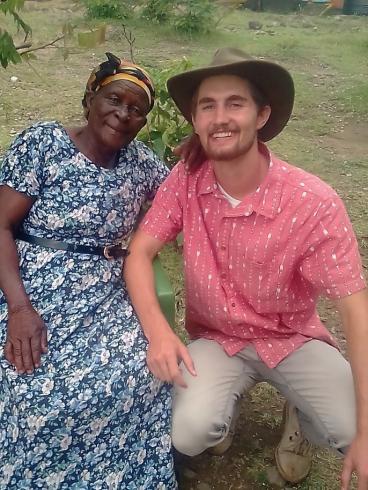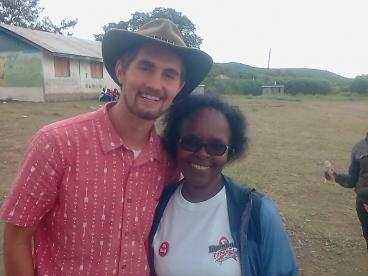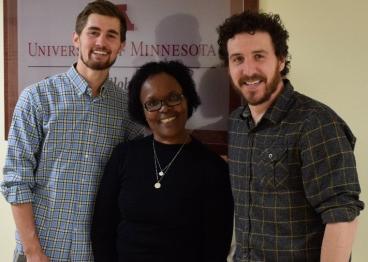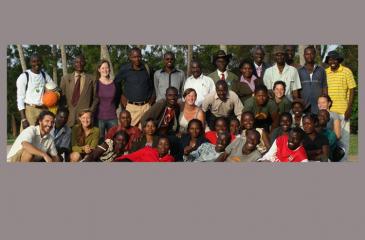The Mfangano Community Health Field Station embraces a community vision of health, where a network of local and international partners work to foster long-term resilience.
When there are no longer words to capture a life lived or a moment in time, we lose something critical. Language is central to human experience. Each of the roughly 7,000 spoken languages in the world are puzzle pieces to understanding our existence. Each piece represents a part of human history and culture; they are the stories passed from one generation to the next.
Mfangano Island lies to the east of Lake Victoria, one of Africa’s great lakes that is shared between Kenya, Uganda, and Tanzania. Mfangano Island is a part of Kenya and home to 26,000 people. Many are descendants of the Abakunta people and speak Suba, an endangered language.
Through an explorers grant supported by National Geographic, the Mfangano Community Health Field Station, a community-rooted enterprise launched in collaboration between the Center for Global Health and Social Responsibility, Maseno University in Kisumu, Kenya, and Organic Health Response (OHR), is embarking on an oral history project to preserve the Suba language and culture.
Nyika Friberg, a pre-med student and recent graduate of the University of Minnesota, was born in Tanzania and attended boarding school in Kenya. He spent the majority of his life in East Africa and grew up speaking Swahili and English. For the past several months, he served with the Mfangano Community Health Field Station hosted at Ekialo Kiona Center, a solar-powered community facility with an organic farm and wind-powered radio studio. He and local Suba radio presenters worked closely to conduct interviews with Suba elders and collected their stories.
“Many African cultures follow a tradition of oral storytelling. It is a critical element to who people are.” - Nyika Friberg, pre-med student
“The Suba way of life is at risk of disappearing on the island and surrounding mainland. Once the elders are gone, much of the Suba language will be lost. We are coming alongside cultural preservation efforts to focus on a specific segment of history of 250 years when people migrated from Uganda to Kenya.”
Suba is a Bantu language that is found only on the remote shores of Lake Victoria. The islanders are believed to have descended from emigrants of the Buganda kingdom who fled after the assassination of Kabaka Jjunju.
Friberg and a team of local research staff traced routes back to Uganda. They visited tombs of kings past and found intriguing overlaps between historical details that elders in distant places mentioned. For many of the locals, the expedition was a homecoming.
As the narratives continue to develop, the next phase of the project is to broadcast these stories over the radio, one of the most influential modes of communication in Africa. The radio show will be in Suba and created by, and for, the Mfangano community.
Chas Salmen, director of the Mfangano Community Health Field Station, believes that the oral history project is central to community health on the island.
“It is the heart and soul,” said Salmen. “There is an opportunity to broadcast information on nutrition and health, while also preserving the Suba language."
"Radio is the medium. It is a way to energize both young and old and protect that cultural flame.” - Chas Salmen, PhD
A Brief History of Mfangano Island
To understand the connection between language and community health, the island’s recent history must first be explored.
Mfangano Island has been a prime fishing location since people first inhabited the island 15 generations ago. Black sandy shores line the rocky edge of the island. In the 1960s, the introduction of the Nile Perch led to tremendous impacts on the land, including migration to the lake, increased fishing pressure, and high rates of HIV around the lake’s shores. Over the last 50 years, the people of Mfangano have experienced a series of devastating events that has left their health, land, and culture in a state of disease and destruction.
Today, Mfangano Island has one of the most HIV-impacted populations on the planet, with 30% of the population infected with HIV, five times more than Kenya’s HIV prevalence rate.
In 2008, a team of local and international activists came together to understand and address the unique socio-economic, epidemiological, and ecological challenges faced by the remote island communities of Lake Victoria. Through community meetings and research, a vision of island health and wellbeing was formed, and Organic Health Response (OHR) was born. The non-profit, community-based organization is championed by a group of Kenyan organic farmers, health workers, and teachers on the island. Through local and global partnerships, OHR works to equip villages with resources, training, and connections to respond “organically”—as unified communities to complex problems.
OHR’s founder, Salmen is a medical anthropologist and assistant professor in the Department of Family Medicine and Community Health. He has done groundbreaking research in exploring the relationship between ecological change in Lake Victoria and HIV epidemiology among Suba fishing communities.
For the past year, OHR, Maseno University, and the University of Minnesota have been working to expand and define how best to apply knowledge and lessons learned to build resilience among this remote population. Through an adaptive “Community Health Ecosystem” model, they are growing transcultural friendships to better understand deep problems and cultivate creative, enduring solutions.
A Community Vision of Health

The Center for Global Health and Social Responsibility (CGHSR) focuses on building lasting relationships with local communities around the world and nurturing the next generation of global health leaders. As a partner to Maseno University, they worked closely with faculty member Dr. Louisa Ndunyu on the MOMENTUM study, a 12-month study to evaluate delays in access to maternal and newborn emergency care.
“This project has the potential to loop in everyone from community members to graduate students to practice in long lasting solutions.” - Louisa Ndunyu, PhD
Ndunyu is a Kenyan lecturer whose research encompasses reproductive health and women’s health. As a co-leader on the MOMENTUM study, Ndunyu worked with community members at nine remote clinics on the island and two hospitals on the mainland to collect patient narratives and track the effect of standard obstetrical and maternal care. She is passionate about mentoring students and sees the work on Mfangano Island as an opportunity to dismantle the ivory towers of academia and research.
“Many people leave the island because they see few job opportunities and only hardships. This work offers an opportunity for people to see themselves as part of the puzzle pieces, and not as strangers, to address the challenges of public health.” said Ndunyu.

Before starting on the National Geographic project, Friberg was able to work side by side with Ndunyu’s graduate students on data collection and interviews for the MOMENTUM study.
“I was the youngest person at the station. I got to work closely with Ndunyu’s team on meaningful research and see immediate impact,” said Friberg. “I’ve taken public health classes before, and it seemed abstract—the problems so vast across so many areas they felt intangible."
"My time on the island showed me community health organizers can find solutions together. You don’t need a big hospital, people in the community can have a huge impact.” - Nyika Friberg, pre-med student
A Future within Reach
On the island, the health of individuals is fundamentally connected to the strength of the community and environmental sustainability.
“If we put in a lot of effort over time, we can solve problems in this small place,” said Salmen. “And yet, even as we arrive at solutions, new problems emerge. Our work lies in equipping people with skills and confidence to respond to challenges as they arise.”
Local capacity building, community-based research, and honest dialogue enable the residents of Mfangano to create a more resilient community that is capable of improving and protecting itself in a limited resource setting. The model set by Mfangano Community Health Field Station has the ability to inspire similar communities along the remote shores of Lake Victoria and beyond.

Ndunyu explains, “My hope is to expand and see more students engaged with communities to generate solutions for themselves; for both students and faculty to reach out more, not only in research, but intervention. There are opportunities for community members to advance and for the quality of life to improve."
"It was good to collaborate with the University of Minnesota. We can create lasting relationships and turn ideas into reality.” - Louisa Ndunyu, PhD
The multi-faceted efforts on Mfangano Island are entirely community-driven and established within historical context. The work of cultural preservation is fundamental to improving health, and not merely a side project. Building cultural pride, creating job opportunities in research and public media encourages people to stay.
Student opportunities through the Mfangano Health Field Station are manifold. Through the MOMENTUM study and National Geographic oral history project, Nyika Friberg had the opportunity to explore intersections of health, anthropology, and media.
“This experience has shaped the trajectory of my future.” - Nyika Friberg, pre-med student
“I get to help other young people know where they’re coming from, and where their family or clan connects to this grand history through the radio series," said Friberg. "I’m excited to see where East Africa is going and my place in a chain of torch bearers.”
2020 marks the 10-year anniversary of the Center for Global Health and Social Responsibility. The interdisciplinary center works across the University’s health sciences to build on the legacy of a number of individual programs dedicated to connecting the University to the world.



